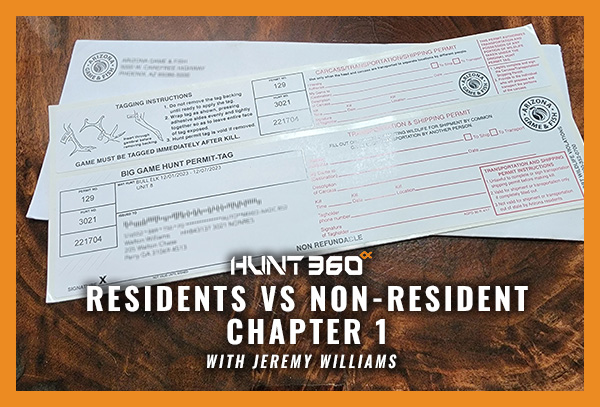| Jeremy Williams |
Resident vs Non-Resident - Chapter 1

I understand that this can be a sensitive topic, but through this series of articles titled 'Resident vs Non-Resident', I aim to offer residents a non-resident hunter's perspective. During a recent hunt with my son in Arizona’s Unit 8 for a late-season bull elk, I experienced what initially seemed unfavorable but ultimately turned out to be a positive. In case you missed the four-part series, I encourage you to start with Chapter One {link here} and follow the subsequent links in each article to continue the journey.
As a Georgia resident from the East Coast, hunting has been a part of my life since childhood. My early years were spent following my dad and grandfather to our private hunting club in Jasper County. This small, 250-acre timber tract is filled with cherished memories. I became familiar with every inch of that piece of property, confidently navigating to tree stands before dawn and returning to the truck after dusk, all without the aid of a headlamp. However, my desire for greater adventures eventually led me westward in pursuit of elk. At sixteen, I embarked on an archery elk hunt in Montrose, Colorado, alongside my father and friends, Ray Brittan and David Morrison. That hunt shaped my future trips as a non-resident, ultimately to the present on the same quest with my now 17 year old son.
Now, 32 years later, I find adventure with my son, Flint, as we travel from state to state seeking big game. My hunting in Georgia has almost ceased, as the landscape here has changed dramatically over the last 20 years. Land is hard to come by, and the pursuit of trophy whitetails has, in my opinion, become very competitive and to an extent very greedy. I'll be the first to admit that I was once one of those guys, obsessed with growing big, high-scoring bucks. I used to preach about letting the young ones live, a statement you've probably seen echoed in thousands of social media posts. But things have changed so much since my youth; back then, we hunted, enjoyed our harvest, and defiantly didn’t give it away for someone else to consume.
As a non-resident hunter seeking tags in states across the country, we never really know where we'll be hunting until a few months before the season starts. This is fine, as we have to navigate the systems each state implements for obtaining a hunting tag. The fees for non-residents are steep, but we’re willing to make those sacrifices to enjoy God's creations with our loved ones. Sometimes, though, it feels unfair that some states require non-residents to purchase a hunting license just to enter a draw with less than a 1% success rate, and then to pay up to 10 times the amount of a resident tag if successful in the draw itself. I realize it's a supply versus demand situation, but it's still extremely expensive for a non-resident to get in the game.
Each state changes its units and rules annually, and keeping up with them is a chore if you're applying as frequently as we do to ensure a successful draw. This is where a third party application company like The Draw brings so much value. Once we receive that famous email of a successful draw result, we then decide whether to hire an outfitter or go for a DIY hunt. Many resident hunters dislike outfitters, and while there are various reasons for this, from a non-resident's perspective, it's often seen as paying someone else to do the hard work. However, this isn’t the case most of the time; it's a complete misconception. Non-residents choosing to hire an outfitter face their own hurdles, including finding the right one who connects you with a knowledgeable and patient guide who seems to always be a resident hunter themselves just trying to do what they love. This is a hunt in itself, and that's where third-party booking agents often step in, raising questions about whether they represent the hunter or the outfitter. Just like any other hunt if your patient and go with your gut you usually find that right representation who will assist with your hunt for an outfitter. For those who opt for a DIY hunt, it all comes down to preparation. It might seem like a money saver not to pay an outfitter, but when you factor in the time spent preparing and the cost of gear, you're nearly at the same expense for the majority of western hunts, especially if you value your time.
These are the aspects that the majority of residents don't see, the ones that a non-resident goes through months before the hunt even begins. In the next part of this series, I will dive into the steps most non-residents go through once they've signed a contract with an outfitter or decided to embark on a DIY hunt. I hope you'll follow along to gain some perspective on the risk versus reward of a non-resident hunt."
|
Sign Up For
|

|
|
What Is HUNT360?
Hunt360 is a community dedicated to providing trustworthy reviews of hunting gear from real people like you. We value your experience - we want to know what gear you've tried, what worked for you, and what didn't. Your reviews matter to other hunters like you and helps us all go out better equipped!
|
|


